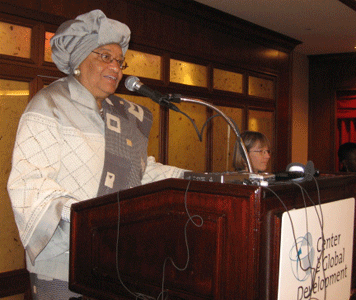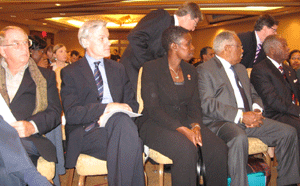
At Development Forum, Sirleaf Points to Progress and Gaps
By Abdoulaye W. Dukulé
Adukule@theperspective.org
Washington DC
The
Perspective
Atlanta, Georgia
February 13, 2007
 |
|
President Ellen Johnson Sirleaf
|
In her speech, President Johnson pinpointed the many successes of the government, which at times could come to sound as a curse. Because, she said, as government makes progress, many of the NGOs that had come in to work in the emergency situation, such as in health and education, start pull out. The other drawback is that as progress is made to attract investors, those to whom Liberia owes money come up with demands for payment. The most typical example was that 1/3 of all health services in the country are covered by NGOs and as the country makes progress, they have to move to other countries facing emergency situations.
With her usual candidness, the President of Liberia pointed to deficiencies of the international aid delivery system. As an example, she cited the security sector reform. She said the US government was in charge of the program, which it funded and entrusted to an American private contractor. After the first badge of Liberian military graduated, and in midstream towards the recruitment and training of a new class, the funds will run out as early as the beginning of March 2007. “The US cannot fail us on this,” she said, pointing to the fact that they had taken everything in their hands and were solely responsible for the success of the program. |
It sounded as if every success government was making in a given area, simply brought up the shortcomings of that sector.
The Governance and Economic Management Assistance Program (GEMAP) also came under discussion. The government of Mrs. Sirleaf inherited the program signed between Liberia and its international partners by the transitional government and however decided to implement it. On the plus side, the program helped Liberia to garner its revenues collections and procurement system. Minister Sayeh pointed to the fact GEMAP has helped in many areas but there was an urgent need for capacity building. The President added that “in the end, Liberians will be responsible for the process.”
The huge debt of Liberia which amount to some $3,700 billion was also an important part of the discussion. Steve Radelet and Jesse Jackson argued that for Liberia to make any substantive progress, the issue has to be dealt with and now. In her speech, the President pointed out that Liberia could in no way service this debt.
All in all, Liberia is finding difficult to tap into the goodwill and promises of the international community. Rather than a dramatic push, the country has so far been given just a little more than lip service. The presence of the United Nations peace keeping force is so far the guarantor of peace but what would happen when it folds up?
Liberia could be the less expensive development program for any nation from a state of chaos to that of fast recovery and exemplary progress. However, it would need the tools to jumpstart this process. The country has tremendous human resources and is endowed with great natural resources. The goodwill and good words of the international community have yet to be translated into palpable actions that would put Liberia on course. This seems to be at the core of the message brought by President Sirleaf to these talks. Will Liberia’s partners listen?